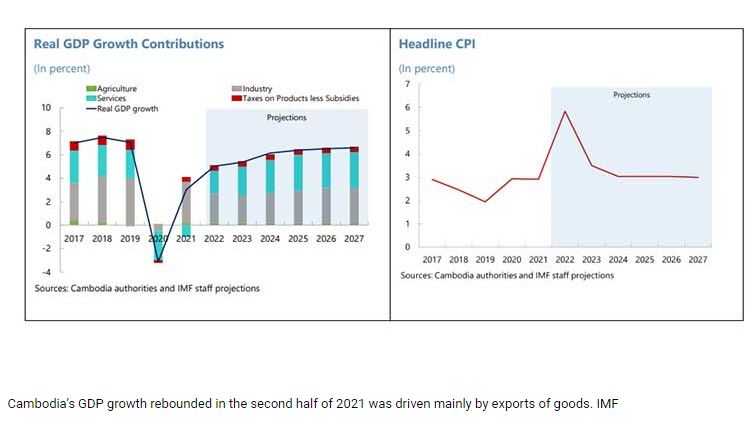‘Cambodia economic recovery projected to continue’
Despite several international developments hurting the progress, Cambodia’s economic recovery is projected to continue in the next year as well, according to the International Monetary Fund (IMF).
“Despite the new pressures, the recovery is projected to continue. Real GDP growth is forecast to be 5 percent in 2022, after the strong export performance earlier in the year, and nearly 5½ percent in 2023, supported by the continued recovery of tourism and ongoing policy support, although dampened by external pressures and the impact of rising prices on real disposal income,” the Executive Board of the IMF, which concluded the Article IV consultation with Cambodia, said.
The executive directors welcomed the Kingdom’s strong economic recovery.
The directors felt that the country’s strong economic buffers and robust crisis response helped in Cambodia’s strong economic recovery from the pandemic.
Pointing out that Cambodia’s GDP growth rebounded in the second half of 2021 driven mainly by exports of goods, the directors opined that the economy had been buffeted by several developments this year.
The included developments in China, the slowdown in consumer demand in advanced countries — the US and Europe are significant markets for Cambodian manufactures — and tighter global financial conditions (mainly via external demand, but also funding costs for some financial institutions).
While saying that the inflation surged, following significant increases in fuel and fertiliser costs, IMF noted that the export orders for the second half of the year have weakened. It also cautioned that the real estate market has been slowing.
“Inflation is expected to peak this year, be lower in 2023, and decline further thereafter, assuming it remains mostly confined to imported goods,” they said.
Uncertainty around the outlook is particularly high, and risks are tilted to the downside. IMF said the most pressing risks are from rising private debt; conditions in key large economies; and inflation.
The public finances are expected to improve gradually, the international agency said, adding that spending pressures and lower-than-expected tax revenue resulted in a fiscal deficit of just over 7 percent of GDP in 2021.
“The deficit is expected to narrow to just over 4 percent of GDP in 2022 with a strong bounce-back in revenues, widen somewhat in 2023, and decrease further thereafter. Public debt-carrying capacity remains vulnerable to further shocks to exports and growth, but risks of external and overall debt distress remain low, so long as public debt is constrained in the future and the increase in private debt is not associated with an increase in contingent liabilities of the sovereign,” IMF pointed out.
The directors were also of the view that the growth outlook is broadly favourable for the country, notwithstanding downside risks from slower external demand and rising domestic vulnerabilities including elevated levels of
private debt.
They also encouraged the authorities to calibrate fiscal policy to help support vulnerable households, without compromising price stability, while also taking steps to address financial sector risks and corruption vulnerabilities.
The directors also encouraged the National Bank of Cambodia to rein in credit growth by gradually restoring monetary conditions to pre-crisis levels. They saw merit in normalising prudential conditions to pre-pandemic settings with heightened supervision and readiness to raise provisioning requirements. They also underscored the importance of implementing corporate insolvency, debt and bank restructuring, and deposit protection frameworks.
The directors supported the authorities’ current fiscal plans to provide insurance against downside risks to aggregate demand while maintaining a steady reduction in fiscal deficits over the medium term.
However, given wide external imbalances and strong credit growth, they emphasized that fiscal support should be well-targeted. Social protection measures should continue to be used to protect the poor against the effects of inflation, coupled with offsetting cuts elsewhere, the directors pointed out.
They noted the importance of policy frameworks to ensure resilience over the longer term. They encouraged efforts to enhance spending efficiency and strengthen revenue mobilisation, including by broadening the tax base and rationalising exemptions. “A debt anchor in nominal terms, combined with an overall deficit ceiling, would provide a credible framework, particularly as Cambodia seeks to develop a market for sovereign debt. The recent issuance of the first domestic government bond is a welcome development,” the directors observed.
They also underscored the importance of complementary structural policies to support strong, inclusive growth. They welcomed the progress made in implementing anti-corruption action plans and encouraged continued efforts to strengthen governance frameworks more broadly. Directors also emphasised the need for structural measures to boost productivity to help raise living standards and to durably restore external balances, given the pegged nominal exchange rate. They also underscored the importance of improving data quality through capacity development and encouraged the authorities to build on recent efforts to strengthen climate adaptation and mitigation.
Under Article IV of the IMF’s Articles of Agreement, the IMF holds bilateral discussions with members, usually every year. A staff team visits the country, collects economic and financial information, and discusses with officials the country’s economic developments and policies. On return to headquarters, the staff prepares a report, which forms the basis for discussion by the Executive Board.
At the conclusion of the discussion, the Managing Director, as Chairman of the Board, summarises the views of Executive Directors, and this summary is transmitted to the country’s authorities, an IMF release said.
Source: https://www.khmertimeskh.com/501205203/cambodia-economic-recovery-projected-to-continue/


 Thailand
Thailand




